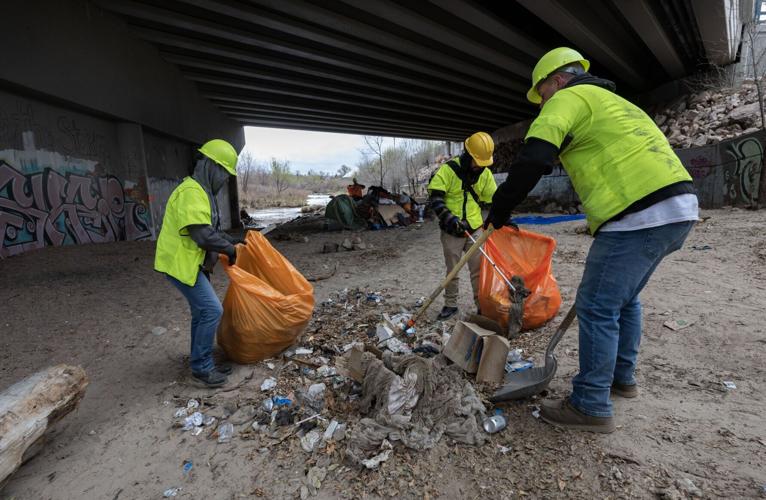Cite, release, repeat: Are Colorado Springs’ homeless trapped in a legal loop?

A crew from the Center for Employment Opportunities clean up the mess along Monument Creek Thursday, April 3, 2025, after the Colorado Springs Police cleared out a homeless camp. The crew doesn't remove people from the camp, but contracts with the City of Colorado Springs to clean up afterwards. A crew can remove about 300 bags of garbage in a day. (The Gazette, Christian Murdock)
Christian Murdock
The defendant who tops the “failure to appear” list for mandatory Colorado Springs Municipal Court hearings has 25 open cases and 300 instances of not showing up, a situation that makes the presiding administrator, Judge HayDen W. Kane II, shake his head and heave a deep sigh.
Another 20 defendants each have racked up more than 100 failures to appear in court, he said. And the blatantly delinquent behavior is increasing.
“It’s a revolving door that is nothing but work for anybody, including the defendant,” Kane said. “We don’t get anything accomplished.”
Many offenders are ticketed for activities related to living in a state of ongoing homelessness.
Cases that come through Colorado Springs Municipal Court involve violations of city provisions or ordinances such as illegal urban camping, sleeping on benches, blocking sidewalks, traffic and parking tickets, minor shoplifting and trespassing, simple assault, zoning infractions, petty disorderly conduct, littering, jaywalking, animal control issues and other matters.
The first thing to understand about the cycle that Kane says has become problematic is that Colorado Springs is “a 100% cite-and-release jurisdiction.”
That means that anyone cited for allegedly violating a city law is not handcuffed and immediately taken to jail, but rather handed a ticket and told to show up in court 21 days later.
But only about 4 in 10 people come to court at the appointed time and day, Kane said. The remainder have a warrant issued for their arrest.
When police run across people — in homeless camps, during traffic stops or other encounters — who have outstanding warrants, some are released on a personal recognizance bond at the discretion of the judge.
“Because we are required to let them go, we give them another court date, and then they don’t show up for court again,” Kane said.
Some picked up for outstanding warrants are booked into the El Paso County Criminal Justice Center and, by state law, must be seen in court within 48 hours.
“If they’re repeat offenders, they’re usually going to jail,” said Sgt. Olav Chaney, who heads the Colorado Springs Police Department’s Homeless Outreach Team of officers who enforce municipal laws, are present during camp cleanups, and do street outreach.
About a quarter of the county jail population at any given time is defined as homeless, El Paso County Sheriff Joe Roybal told Colorado Springs City Council in February.
If the bail amount on a warrant is set at $200 or less, the defendant can arrange for a new court date; if it’s higher, a bond is needed for the defendant to be released from custody.
“We keep picking them up, we see them the next day on the jail docket, we release them, they qualify for a court-appointed attorney, they don’t show up again, and we see them over and over,” Kane said.
A quick look at booking records for El Paso County jail shows a self-identified homeless woman taken to jail in March had 57 warrants and 15 previous bookings. A man who entered jail at the same time had 15 warrants and 13 previous bookings.
Both faced similar charges related to several camping violations, on top of individual counts of prohibited open burning, littering, obstruction or interference with traffic and being in a park after hours.
Homeless people generally do not have fines imposed on citations, Kane said.
“We routinely waive monetary conditions; we’re taking the position we’re setting the defendant up for failure because there’s no way they can take care of it,” he said.
Cleanup leads to arrests
To outsiders, the incessant pattern may seem futile, but to those on the job, enforcing municipal laws is important and matters.
“It can be frustrating for everybody, and some people wonder why we write tickets,” said Chaney, the police sergeant. “Ultimately, people have to be held accountable. Otherwise, we become camp cities, and trash is out of control.”
And at some point, he notes, most everyone who ignores the conditions of citations goes to jail.
“We had a camper on the west side recently get 189 days in jail. Sometimes it takes a while, but maybe there’s a lesson learned,” Chaney said.
Municipal Court saw more cases following a massive two-day multiagency homeless camp cleanup last Wednesday and Thursday.
While the city continually removes garbage and debris from homeless camps, last week’s intensive, targeted effort represented the largest coordinated event the city has undertaken, according to Chaney.
Many were involved: city police and fire, utilities, parks, trail rangers, representatives from the BNSF Railway, which owns property affected by homeless encampments, the Sheriff’s Office, the Colorado Department of Transportation and Keep Colorado Springs Beautiful.
Local homeless service agencies including Springs Rescue Mission, Homeward Pikes Peak and Serenity Recovery Connection spoke with people and distributed materials on how they can find assistance at emergency shelters, addiction recovery programs and transitional housing.
Workers blanketed illegal campsites from north and south along the Midland and Greenway trails. They hauled out tents, tarps, shopping carts, buckets of excrement, items for cooking, food containers, bottles and cans, spent needles used for injecting drugs and other debris that littered the land.
Camp occupants had been warned the previous week that the cleanup was happening, but some did not leave and seemed angry at the intrusion. Workers heard shouts of protest as they arrived and began picking up what had been left behind.
“Some people think we’re just harassing them, but we do offer to help them get off the streets,” Chaney said.
A familiar scenario developed Thursday, as one camper returned immediately after crews left a cleared encampment under the Nevada Avenue bridge, a trend Chaney said his Homeless Outreach Team is working to stop.
“My focus is to run through these areas regularly,” he said.
Early estimates showed the 1,000 cubic yards of trash removed from the two-day sweep would create a pile 6 feet deep across a regulation basketball court, according to Police Department spokesman Ira Cronin.
Police arrested five people with active warrants for felonies, included one unregistered sex offender. Police also made 60 misdemeanor warrant arrests and three misdemeanor drug arrests. And they wrote five tickets for waterway violations, nine for trespassing, and two for illegal camping.
Mounting complaints from residents, business owners and trail users led to the cleanup, Chaney said. Dorchester and Vermijo parks, the top two concerns for illegal activity in city parks, also were part of the operation.
“People are worried about fires close to their properties,” Chaney said. “One man owns rentals and said people were breaking their leases because of the homeless issues.”
Trail riders have reported people defecating and urinating and aggressively blocking the paths.
“One lady had a propane tank stolen from her grill and said she lives paycheck to paycheck and can’t afford to buy another tank,” Chaney said. The cleanup crew collected 100 propane tanks from homeless camps and gave her two to replace the one she lost, he said.
For and against change
A camper who gave his name as Dragona said he’s received three citations in the week he’s been sleeping in a city park and has no intention of dealing with them.
“I’m pretty positive I’ll be able to eliminate them,” he said, adding that he used one of the tickets to roll a marijuana joint that he smoked. “Nobody takes these tickets seriously. It irks me. It’s a pitiful joke.”
The number of people repeatedly not appearing in court for suspected municipal violations began increasing after state reform that decriminalized and reduced the severity of penalties and charges for felonies and misdemeanors, Kane said.
Under the state’s Democratic controlled General Assembly, leniency for low-level offenses has lessened the judicial system’s ability to handle municipal offenders, he said.
Kane testified last week at a hearing on House Bill 25-1276, which he believes would help by allowing the court to place a monetary condition on people who have three or more failures to appear and/or at least two open cases.
“Right now, they don’t have to do anything — they just sign up for the next court date and are released,” he said. “If the bill passes, they’d have to post a bond to be released.”
Rebecca Wallace, policy director for Colorado Freedom Fund, a nonprofit criminal legal bond fund that seeks to end cash bail in Colorado without carceral replacements, opposes the bill.
“Municipal courts have ample mechanisms to address failures to appear in court,” she said via email. “They can and do already issue arrest warrants and set cash bond when defendants fail to appear for court, even for lowest-level poverty offenses like sleeping on a sidewalk or park bench.”
Defendants who are homeless often miss court because of mental health, substance abuse or deep poverty, Wallace said.
“Our county jails should not be used as municipal debtor’s prisons or homeless shelters,” she said. “This is counter to public safety.”
Wallace cites “municipal court practices” such as delayed hearings, appointments with legal counsel and case resolutions as contributing to failures to appear.
“If municipal courts adjusted their practices in these common-sense ways, we would see a substantial reduction in failures to appear,” she said. “Instead, municipalities through this bill are seeking to hold the poorest Coloradans in jail for weeks or months on low cash bond until they plead or go to trial. This is incredibly unjust.”
The current system isn’t working, Kane argues, saying “caseload has been increasing across the board since the pandemic.” Overall case filings increased 24% last year over the previous year for a total of 146,900, according to court data.
A resource table in Colorado Springs Municipal Court that’s manned by the Colorado Springs Fire Department’s Homeless Outreach Program has seen success in providing homeless defendants with materials to help them get off the streets. That includes information on housing, vital records, bus passes, recovery programs, federal government benefits such as food stamps, food and clothing assistance and mental health providers.
In 2023, 294 clients stopped by; last year; the number increased by 17% to 348 clients. Kane said the program is now expanding to the county jail.
An “Amnesty Day” program, which began in Colorado Springs in 2019 to dismiss bench warrants on minor offenses for homeless people via video conference set up at Springs Rescue Mission, became a casualty of the COVID-19 pandemic.
The rescue mission, the city’s largest shelter, accommodated 426 people overnight last Wednesday, said President and CEO Travis Williams, with numbers topping 400 more consistently this year.
Since Jan. 1, he said 22 people moved into a new transitional housing complex the organization opened last year, and on any given day, 30% of clients, or 140 to 150 people, are enrolled in proactive programs for addiction recovery, job training and re-housing.
“Our relationship-centered model provides real opportunity for transformation, without requiring sobriety as a condition for care,” Williams said. “Our campus exists so no one has to sleep outside; we offer a proven alternative based on low-barrier accessibility, choice whether to engage in programming and compassion.”
Contact the writer: 719-476-1656.












